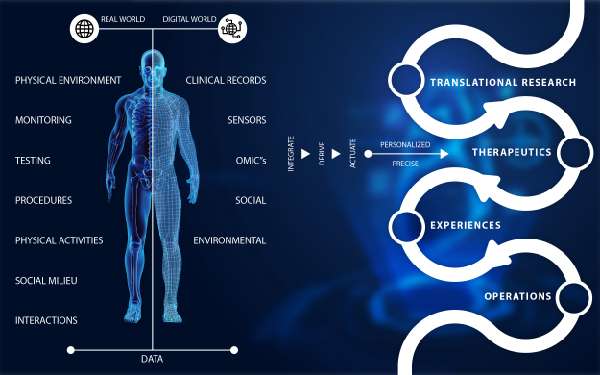
Re/Cappin’ day is upon us Re/Cappers. And yet, it’s nowhere near as neat as yesterday.
That would be World Metrology Day, celebrated every May 20th since 1875 on account of the Metre Convention that very year. And it was some day of enormity, not just a bunch of surveyors flaunting their newest theodolite waiting for the happy hour, oh no.
17 countries signed a treaty of global collaboration in measurement science and its myriad applications. Our world got better, and that same collab is still rocking today, in the form of BIPM and OIML.

Now the International Bureau of Weights and Measures. Image credit U.S. Metric Association.
Wait a tick! According to calendar measurement, next year will be #150.
Better be some happy hour.
What’s Cappenin’ This Week: Digital bio-twins, photogrammetric automation, an AI divide in UK geospatial, LiDAR monitors crops like the world’s best parole officer, and a don’t-forget-your-helmet AEC Error of the Week.
Last week on Icelandic volcanoes igniting mapping, Depression-era structures getting preserved, Verizon wanting drones to be storm chasers, McKinsey weighing on digital twins, and an AEC Error of the Week that travels to Down Under, where a budget proved to be anything but!
Even if at a slower rate, the global population is still growing.
Our food production and management skills are not.

A watched pot may never boil, but an unwatched crop may never yield! Image credit APO Geospatial
It’s a problem, but one for which a project out of the UK's Aston University may have the solution.
Funding from the UK Royal Society will advance polarimetric LiDAR, the focal point of Sergey Sergeyev’s lab at Aston Institute of Photonic Technologies. The ambition? Novel remote sensing approaches toward information & communication technology in farming for increased food production. Yum. Deets below.
A decade ago, as demand grew for their photorealistic scans delivered mostly to museums and creatives, a group of students became obsessed with one improvement; automation.
Today, the only thing more automated than what they created and honed, is the attraction from a plethora of industries.

There’s nothing rocky about Rigsters’ rigs. Image credit befores & afters
That’s life for Rigsters, the Danish photogrammasters whose signature Arago platform streamlines workflows in fashion e-commerce, gaming, VFX, cultural heritage, and more. Read the superb profile as covered by befores & afters, full of journeys, processes, use cases, and of course, latest software updates.
1) Preventative
2) Real-time
Two words emblematic of the unicorn that is the digital twin.
They’re also two words that may define the health care revolution we all know is needed.

Don’t worry, we all searched “social milieu” too. Image credit Faststream Technologies
Of course, a digital twin is only as useful as its received data. Well, when it comes to our health, what’s more useful than knowing our biology?
Scientific American explains why nothing is, and why three developments render the digital twin a must-invest technology, right now, for manifesting personalized medicine.
It’s official. Pineapple on pizza has been dethroned as the most divisive topic known to humankind. All thanks to AIkind.

Machine learning = mapping learning? Image credit Hexagon
Geospatial is no exception, as FARO beautifully illustrates in a guest post on PBC Today. Click below for a multitude of AI & fiscal projections, statistics, geospatial trends & debates, and of course, FARO’s take on its own tools and implementation. As a special bonus, 2001: A Space Odyssey fans will enjoy its presence as a motif.

London’s Leadenhall Building, colloquially known as The Cheesegrater. Image credit dezeen
When the Leadenhall Building began taking its distinct shape in the London skyline a decade ago, it was poised to be an illustrious addition to the city's architectural repertoire. But within mere months of “The Cheesegrater’s” doneness, some of its “mega-bolts” decided they were done too, while legal proceedings would just be beginning.
As in, arm-sized steel bolts fell from the 47-story cheddar tower, prompting the area below to be cordoned off while a safety net was fashioned. THEN IT HAPPENED AGAIN!
Hallelujah, it’s raining men? More like raining bolts!
The culprit is a rarity, a first for the AECEotW, and wholly fascinating - hydrogen embrittlement. Click that link for a microscopic analysis, but essentially, it’s the ol’ water molecule just deciding to get some form of AEC rabies and wreak havoc by increasing pressure in micro-cavities.
Now, let's be fair - constructing a 737-foot high-rise is no simple cabernet & cranberry brie pairing. Not to mention, hydrogen embrittlement is downright anomalous. But what it isn’t, is rapid; it can occur as early as the galvanizing process, much less during construction.
Therefore, judicious use of reality capture and digital twin technologies would have almost certainly caught this when it was still a concern, rather than a southbound steel projectile. And given that the legal sparring surrounding The Cheesegrater took longer than the world’s priciest parmesan aging process, it would have saved millions. Virtual simulations may have even identified optimal ways to reinforce connections preemptively.
Confucius may or may not have said it, but…say yes to technology, and no to stuff falling from way up.







By subscribing, you are agreeing to RCN’s Terms and Conditions of Use. To learn how RCN collects, uses, shares, and protects your personal data, please see RCN’s Privacy Policy.

Reality Capture Network • Copyright 2025 • All rights reserved